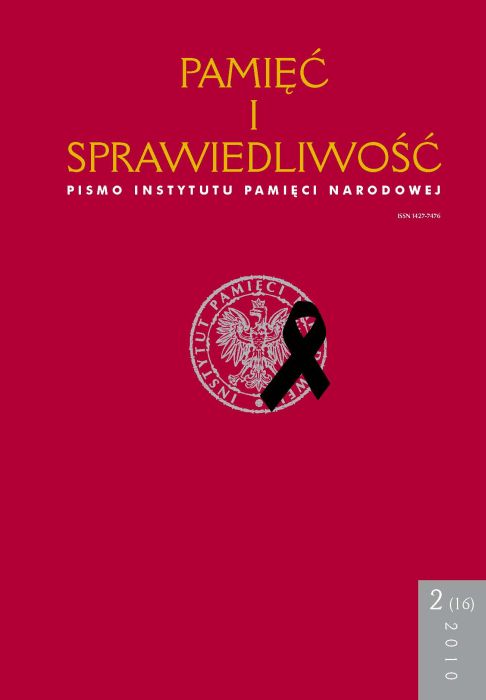Służba Bezpieczeństwa wobec NSZZ „Solidarność” w Słupsku w latach 1980–1981
Pamięć i Sprawiedliwość, Bd. 16 Nr. 2 (2010), pages: 75-103
Publication date: 2010-12-30
Abstract
The Security Service (SB), especially the Department III A of the provincial Citizen’s Militia headquarter (KW MO – Komenda Wojewódzka Milicji Obywtelskiej) in Słupsk administrated by major/colonel Stanisław Kwiatkowski, took a close interest in the activity of the Independent Self-governing Trade Union “Solidarity” (NSZZ “Solidarność”), from the very beginning of its existence in
that region. The SB functionaries tried not only to collect any piece of information about the activity of the Inter-Factory Founding Committee’s (Międzyzakładowy Komitet Założycielski, MKZ) presidium members and – from June 1981 – of the Regional Administration’s (Zarząd Regionu) members, but also to paralyse some of their projects. In order to achieve it, the SB made use of inner MKZ’s conflicts that occurred a few months after the foundation of the “Solidarity”.
The main case concerning the trade union’s structures in Słupsk was codenamed “Aktyw” (the “Active members”). Apart from that, there were some minor operational activities carried out against particular company organizations or against individuals. What is more, all members of the Young Poland Movement – (“Ruch Młodej Polski”, “Odnowiciele”) and activists of the Committee for the Defence of Prisoners of Conscience – “Chameleon” (“Komitet Obrony Więzionych za Przekonania”, “Kameleon”) were being individually kept under active surveillance.
The Security Service had dozens of its secret collaborators (tajny współpracownik, TW) working in the structures of the “Solidarity” in Słupsk. Stanisław Gargol (known as TW “Rakoczy” and TW “Roman”) – chief of the Office of Intervention (Biuro Interwencji), as well as Wojciech Zierke (TW “Jola”), who was recruited as secret collaborator probably after being elected leader of the Regional Administration’s in Słupsk, both of them were considered to be the most dangerous functionaries.
After imposition of martial law, the SB did not cease its actions against “Solidarity” movement, however, new circumstances forced it to re-determined hitherto methods and purposes of its activity.
Am häufigsten gelesenen Artikel dieser/dieses Autor/in
- Igor Hałagida, Ukraińskie straty osobowe w dystrykcie lubelskim (październik 1939−lipiec 1944) – wstępna analiza materiału statystycznego , Pamięć i Sprawiedliwość: Bd. 29 Nr. 1 (2017)
- Igor Hałagida, Deportacje greckokatolickich biskupów przemyskich do USRR w 1945 i 1946 roku. Nowe dokumenty , Pamięć i Sprawiedliwość: Bd. 13 Nr. 2 (2008)
- Igor Hałagida, Nieznane instrukcje MBP dotyczące akcji „Wisła” , Pamięć i Sprawiedliwość: Bd. 6 Nr. 2 (2004)
- Igor Hałagida, [Recenzja] Eugeniusz Mironowicz, Polityka narodowościowa PRL, Białoruskie Towarzystwo Historyczne, Białystok 2000, ss. 284 , Pamięć i Sprawiedliwość: Bd. 1 Nr. 1 (2002)
 Język Polski
Język Polski
 English
English
 Deutsch
Deutsch
 Français (France)
Français (France)
 Italiano
Italiano
 Русский
Русский


 PDF (Język Polski)
PDF (Język Polski)
